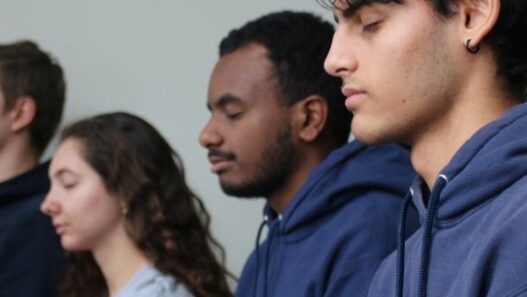“Discover the transformative power of Transcendental Meditation in New York. Start your journey towards inner peace and clarity today with Transcendental Meditation classes in New York.
The Benefits of Learning Transcendental Meditation in New York
 Living in New York City can be exhilarating, but it often comes with a fast-paced lifestyle and stress. Transcendental Meditation (TM) offers a way to find balance and calm in this bustling environment. If you’re looking to reduce stress, increase creativity, and improve your mental and physical well-being, learning TM might be the perfect solution. Here’s what you need to know about learning TM in New York and how it can benefit you.
Living in New York City can be exhilarating, but it often comes with a fast-paced lifestyle and stress. Transcendental Meditation (TM) offers a way to find balance and calm in this bustling environment. If you’re looking to reduce stress, increase creativity, and improve your mental and physical well-being, learning TM might be the perfect solution. Here’s what you need to know about learning TM in New York and how it can benefit you.
What is Transcendental Meditation?
Transcendental Meditation is an effortless technique where you sit comfortably with your eyes closed and silently repeat a personalized mantra. This process helps the mind settle into a state of restful alertness, leading to deep relaxation and heightened awareness. TM does not involve concentration or control of thoughts, which makes it accessible to anyone, regardless of age or background.
Why Learn Transcendental Meditation in New York?
1. Stress Relief in a Busy City
New York City is known for its high stress levels, but TM offers an effective way to reduce stress and anxiety. The practice helps calm the mind and body, giving you a break from the pressures of daily life.
2. Increased Focus and Creativity
Practicing TM regularly has been shown to improve focus and cognitive function. For those juggling demanding work and personal life in the city, TM provides the mental clarity needed to stay productive.
3. Physical Health Benefits
Beyond mental relaxation, TM can improve physical health by reducing blood pressure, lowering the risk of heart disease, and boosting immune function. It’s a natural way to support your body’s healing processes.
4. Long-term Benefits
One of the key takeaways from scientific research on TM is its cumulative effect. Long-term practitioners not only report lower stress levels but also improvements in overall quality of life, including emotional stability and a deeper sense of inner peace. These findings are supported by studies across diverse populations, including students, professionals, and individuals suffering from post-traumatic stress disorder (PTSD).
How to Learn Transcendental Meditation in New York
TM is taught through certified instructors at TM centers across New York. Centers in Manhattan and Brooklyn offer personalized one-on-one instruction, ensuring you learn the correct technique. TM classes typically include:
- Personal instruction with a certified TM teacher
- Group sessions with other learners
- Ongoing support, including follow-up sessions and group meditations
Payment plans and scholarships are often available to make learning TM accessible to everyone.
Community and Support
TM centers in New York offer more than just instruction. They provide a sense of community through group meditations and events, allowing you to connect with others who are on a similar journey. This support network can help keep you motivated and engaged in your practice.
How transcendental meditation compares with other practices
Transcendental Meditation (TM) is a specific form of meditation that differs from other forms of meditation in a number of ways. Some key differences include:
- Technique: TM involves the use of a specific sound or mantra while other forms of meditation may not use a mantra or may use a different type of focus.
- Effortlessness: TM is effortless and requires no concentration or mental control, while other forms of meditation may require more effort and concentration.
- Benefits: TM is unique in its focus on the experience of transcendence, a state of pure consciousness beyond thought, which is said to bring a deep sense of inner peace and well-being. Other forms of meditation may focus on different benefits, such as mindfulness or stress reduction.
- Scientific Support: There has been a significant amount of scientific research into the effects of TM, including studies on its potential to improve physical and mental health. Other forms of meditation have also been the subject of research, but the level of scientific support may vary.
While these distinctions highlight TM’s unique approach, it’s also crucial to consider how TM compares with other meditation techniques like Mindfulness, Zen, and Guided Meditation. Research has shown that TM produces a unique style of brain functioning and deep relaxation not found in these other practices.
For those interested in delving deeper into how each method stacks up scientifically, there are extensive studies available that explore these comparisons, offering insights into the distinctive benefits and experiences each meditation practice provides.
Frequently Asked Questions (Q&A)
Q: How is TM different from other forms of meditation?
A: Unlike mindfulness or other techniques, TM does not involve focusing on breath or monitoring thoughts. Instead, it allows your mind to naturally settle inward to a state of restful alertness, without any effort or control.
Q: Do I need to practice TM for a long time to see benefits?
A: Many people start experiencing benefits, such as reduced stress and improved clarity, soon after beginning TM. The effects build over time with regular practice.
Q: Can I learn TM from a book or app?
A: TM must be learned from a certified teacher in person. The technique is highly personalized, and proper instruction is key to ensuring you’re practicing it correctly.
Q: How long does each TM session take?
A: TM sessions are typically 20 minutes long, and it is recommended to practice twice a day—once in the morning and once in the evening.
Q: Is TM a religious practice?
A: No, TM is not affiliated with any religion. It is a universal technique that can be practiced by people of all backgrounds and beliefs.
Q: What if I have trouble concentrating?
A: TM does not require concentration or effort. Even if you think you struggle with controlling your mind, TM is designed to be effortless, allowing your mind to relax naturally.
Q: How much does it cost to learn TM in New York?
A: The cost varies depending on the TM center and any available discounts or scholarships. Many centers offer flexible payment plans and reduced rates for students or those with financial constraints.
Q: How often do I need to practice TM to see results?
A: Practicing TM twice a day, for 20 minutes each session, is recommended to experience the full range of benefits. However, even once a day can make a difference.
Q: Can TM help with physical health conditions?
A: Yes, research has shown that TM can lower blood pressure, reduce the risk of heart disease, and improve sleep quality by activating the body’s natural healing processes.
Q: Is there ongoing support after learning TM?
A: Yes, TM centers offer continuous support through follow-up sessions, group meditations, and access to certified instructors for any questions you may have.
Conclusion: Why You Should Learn TM in New York
Transcendental Meditation offers a simple yet powerful tool to help manage stress, improve focus, and support your physical health. With expert guidance and a supportive community, learning TM in New York is a rewarding journey that can enhance your overall well-being. Whether you’re seeking relief from the daily pressures of city life or looking to improve your mental clarity, TM provides a path to lasting inner peace.
Ready to start? Find your local TM center in New York and begin your meditation journey today!




















